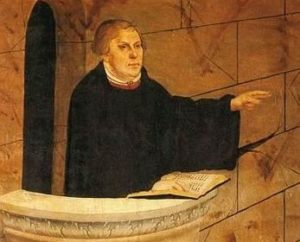The Lord be with you
 We have often heard of the great Reformation theme Sola Scriptura. This, though, applied to more than just the source of our teaching. See how Martin Luther masterfully, in these sermon snippets, uses this theme in reference to our righteousness, the work of the Holy Spirit, and sanctification.
We have often heard of the great Reformation theme Sola Scriptura. This, though, applied to more than just the source of our teaching. See how Martin Luther masterfully, in these sermon snippets, uses this theme in reference to our righteousness, the work of the Holy Spirit, and sanctification.
I have often admonished you that we must cling to the Word; otherwise there is no aid or help. We do not receive anything otherwise than through the Word of the Gospel, the Sacrament, Baptism. Whatever I would boast of beyond that is from Satan. It is from the devil, because the words are: “We wait for the hope of righteousness” [Gal. 5:5] “in order to grasp Him in whom I have been grasped” [cf. Phil. 3:12]. Christ Himself has won and grasped us, so that He is our life and faith. We ascend with Christ, because we come to heaven equally with Him, because, regarding His resurrection, He has joined Himself to us so that it is our true resurrection [cf. Eph. 2:6]. We sit in governing power, since everything is included in Him. What is lacking is that we again grasp Him. When a mother has her child in her arms, the child knows nothing about it; she does not know her as her mother. It is lacking because the child does not have such a great understanding and reason. For that reason she cannot say, “I am your daughter; you are my mother.” In time the reason of the girl grows so that she can say, “Dear mother.” It happens similarly with us.
… Thus I cannot say here that Christian righteousness consists in my will to do this or that, but rather that I most firmly believe that He made satisfaction for me; that Christ’s resurrection, ascension, and sitting at the right hand of the Father are mine; that He has me in His bosom and that I am with Him. That is not my work. This pertains to my faith; that Christ is acknowledged as my righteousness. Then what is not yet pure will cease when I arrive there. When we come there, we will see it. The first part is Christ, because He has risen, ascended, and sits at the right hand of the Father; the second part is that you believe this. It consists of these two parts. If this happens, then you have both formal and subjective righteousness. If there is sin, it is covered over and is called “the forgiveness of sins.” This is the preaching of the Holy Spirit.
… If I have lost the Word and the tongues are quenched*, then all is lost. Thus everything is placed in the Word, which teaches things that we have not yet seen which have grasped us. God has already taken us into His arms. And if you remain in the Word, then you will richly see and apprehend, know and see, as you now have been apprehended. We now have this passively. Later we will have it actively. Now we have this in hope; afterward we will experience it.
Luther, Martin Luther’s Works, Volume 57, Sermons IV Concordia Publishing House, 2016 (6, 7, 8) American Edition
* This sermon was preached in the afternoon of May 28, 1531, which was Pentecost Sunday. This accounts for Luther’s reference to the Holy Spirit with the phrase “the tongues are quenched.” He is saying that the Holy Spirit works through the Word of God (word – speech- tongues; get it?). If the Word of God is quenched, the Spirit’s tongue is quenched. If the Spirit’s tongue is quenched, then the Spirit’s work is quenched.
Blessings in Christ,
Pastor Rickert
